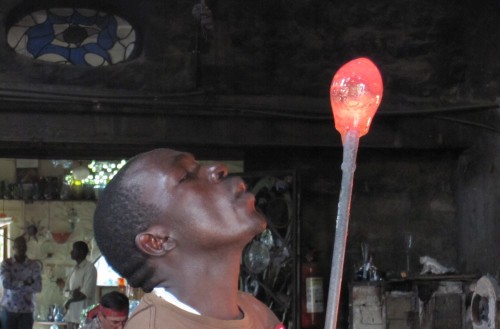Image: Kitengela Glass (Photo: Flickr, Wendy Tanner).
Spent the day at a ‘Doing Development Differently’ event recently and, while it offered a great opportunity to meet and hear from fascinating, dedicated, thoughtful people, I came away somewhat disheartened. Why? Because:
a) the consensus seemed to be that ‘what we have done so far hasn’t worked, so we need something different, something new’, and
b) everything was framed from the perspective of problems.
For years, the development industry has spoken at great length about ‘empowerment’ and strengths-based programming, but too often on-the-ground work has focused on problems to be ‘solved’ and gaps to be filled. I think we need to start doing what we say we do, rather than saying one thing and doing another. And yes, this is a very broad brushstroke; apologies for tarring everyone with the same brush.
However, drawing on more than 15 years’ experience in South East Asia, I can say that much of the work I have seen/participated in/evaluated only looks great on paper. We say that community members have been engaged in the design, implementation and evaluation of interventions. We say that projects have built on local knowledge and local culture, and that they have made a difference to the lives of the most vulnerable and marginalised. Practice, however, too often reverts to technocratic, bureaucratic and pragmatic delivery that concentrates largely on spending money and counting numbers. Those numbers are rarely disaggregated in ways that allow us to see whether those who have been reached are, indeed, the most vulnerable and marginalised.
The way in which ‘big data’ can work to obscure inequality is most clearly demonstrated by the MDGs. ‘It is possible to achieve most of the targets without addressing extreme poverty of the most excluded in a society’ notes Malcolm Langford in a report on Human Rights and MDGs in Practice (161 KB PDF). The UN’s own Special Expert on Minorities has noted that the focus on the MDGs has masked the problems faced by ethnic minorities (628 KB PDF), albeit unintentionally, because of the way in which data is aggregated.
When I asked my Doing Development Differently colleagues why problems were our focus (Problem Driven Iterative Adaptation, to give yet another much-loved development acronym, PDIA, its full name), several were bemused. What else, I was asked, could we focus on?
The answer, as any good community development practitioner would tell you, is assets (578 KB PDF). Assets can be:
• The practical skills, capacity and knowledge of local residents;
• The passions and interests of local people that give the energy for change;
• The networks and connections in a community;
• The effectiveness of local community and voluntary associations;
• The resources of public, private and third sector organisations available to support a community;
• The physical and economic resources of a place that enhance wellbeing.
An asset-based approach sees a half-full glass. Yes, there are problems (of course), but we need to focus on the resilience and experience and knowledge of those who are living with those problems.
Doing Development Differently promotes practice in which local people lead the process of identifying and ‘fixing’, with some external help. I applaud this; it is, after all, what we in the development industry have been saying we do for many a long year. Even so, focusing on problems is disempowering, no matter who gets to identify the problem.
I also understand that a problem-focused approach can be seen as a positive response to existing challenges. The World Bank’s Good Practice Framework (665 KB PDF) is front and centre here. As Verena Fritz argued in a World Bank blog last year:
… a “problem-driven” approach means starting from a specific issue rather than focusing on a broad analysis. Such a focus gives the analysis a clear scope and helps arriving at conclusions and recommendations that are actionable for Bank teams and/or the government counterparts.
And yet a problem-driven approach is still a deficit approach. Something is missing, or malfunctioning, or misunderstood, and has to be fixed. A deficit approach, say Foot and Hopkins:
… designs services to fill the gaps and fix the problems. As a result, the community can feel disempowered and dependent; people can become passive recipients of expensive services rather than active agents in their own and their families’ lives.
An asset-based programme can still effectively address issues, but the focus is on using what’s already there and building on it. As noted in a Glasgow Centre for Population Health paper:
Asset-based approaches value the capacity, skills and knowledge and connections in individuals and communities. They focus on the positive capacity of individuals and communities rather than solely on their needs, deficits and problems. These assets can act as the foundation from which to build a positive future.
That’s empowerment, in practice.










